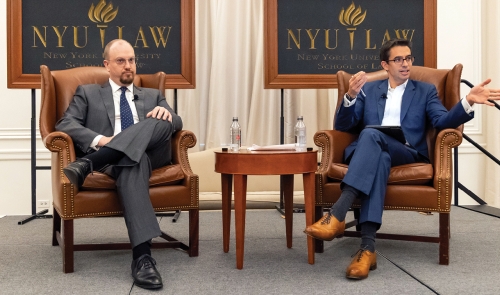At a Latham & Watkins Forum, a new FTC Commissioner talks Big Tech and changes to antitrust

In a year when antitrust has been in the headlines—from the firing of two Federal Trade Commission (FTC) Commissioners to controversial court decisions against Google—FTC Commissioner Mark Meador sat down on September 10 with Professor Daniel Francis JSD ’20 for an NYU Law Forum, sponsored by Latham & Watkins, titled “The Antitrust Revolution.” Among the topics they discussed were the future of the FTC, new developments in antitrust action, and the role of the agency in managing competition among tech companies.
Watch the full video of the Forum featuring FTC Commissioner Meador.
Meador, who left Kressin Meador LLC to join the FTC in April 2025, reflected on the way that antitrust has traditionally been viewed in politics, as well as his own philosophy of how the FTC should operate within the law. “If you read the legislative and public debates around the antitrust laws at the time that they were enacted, starting from the Sherman Act through the amendments to the Clayton Act, [antitrust policy is] not limited to maximizing output, reducing prices, and creating efficiency,” he said. “But it’s really nested within this much broader conversation over political economy and economic fairness and what the role of the government is, and ensuring that markets work to the benefit of the average person, not just large corporations.” Balancing tendencies towards over-deterrence and under-deterrence has been the central question of antitrust law over its history, said Meador.
“This is why I think things are changing now, is because the average person looks at the world and they ask themselves, ‘Do I think that this economy is working for me?’ And we’re at a point where more and more people are saying ‘No,’” Meador told Francis. He suggested that this sentiment provides an opportunity to reevaluate statutes and enforcement policies, while reconsidering the role of the FTC as originally decided by Congress.
Meador and Francis also discussed the role of the FTC as an independent agency and its relationship with the Department of Justice’s Antitrust Division, which handles civil and criminal investigations of antitrust matters under the Sherman Antitrust Act of 1890. “The way I’ve always viewed the FTC Act is we have a broader remit with more narrow remedies, right? We are primarily focused on injunctive relief under unfair methods of competition,” Meador said. “Which makes sense, because if you’re going after something that’s potentially novel, you don’t want to saddle somebody with terrible damages and the potential for follow-on lawsuits and all of that. But it ensures that there is a cop on the beat who is looking out for conduct that is harming competition but yet may not meet the standard the courts have developed for Sections 1 and 2 of the Sherman Act, and so this is a unique feature of the agency.”
Discussing the broader theme of how the FTC promotes fairness in the economy, Meador and Francis focused on the agency’s role in competition rulemaking. Meador pushed back on the idea of completely banning noncompete contracts, which are agreements signed by employees of certain industries that prevent them from working for rival companies in the same field. “I just don’t think [broad bans of all noncompete agreements are] correct as a matter of law or policy. Some non-competes are good,” said Meador. “But at the same time, non-competes have absolutely been overused and abused, and it’s a real problem.” This perspective, he said, informs the FTC’s recent request for information from the public to better understand the scope and use of noncompete agreements at workplaces.
Finally, Meador and Francis discussed recent antitrust cases against Google. In 2024 and 2025, in two separate cases, courts found that Google held illegal monopolies in ad tech and search markets. “Is this a moment?” Francis asked. “Or, you know, this wave will wash through and then we’ll have done what we need to do on the tech side as long as we get regular antitrust back into whatever condition one might think desirable?”
“For all of the reasons we’ve talked about already, I don’t think this moment is a flash in the pan,” Meador replied. “I think that it is growing out of deeper sentiments and concerns about economic fairness and economic regulation and policy at a very broad level. And this is just one manifestation of it. I think that’s a generational thing. I think it’s only going to amplify. So, I don’t think it’s going away.”

